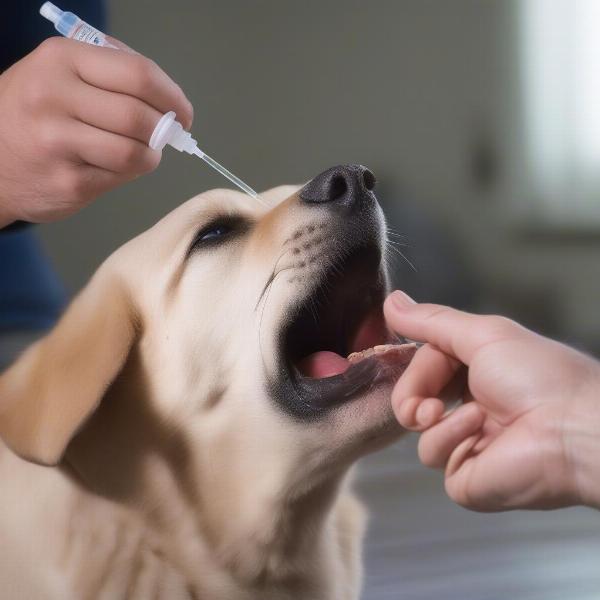Strongid, a common name for pyrantel pamoate, is a widely used dewormer for dogs. Understanding the correct strongid dose for dogs is crucial for effectively treating intestinal parasites while ensuring your pet’s safety. This article will provide you with a comprehensive guide to Strongid, including dosage information, administration, potential side effects, and frequently asked questions.
Understanding Strongid for Dogs
Strongid works by paralyzing certain types of intestinal worms, allowing them to be expelled from your dog’s system. It is effective against hookworms and roundworms, two common parasites that can cause a variety of health problems in dogs. However, it’s important to remember that Strongid isn’t effective against all types of worms, so consulting with your veterinarian is crucial for accurate diagnosis and treatment.
 Administering Strongid to a Dog
Administering Strongid to a Dog
Determining the Correct Strongid Dose for Dogs
The correct strongid dose for dogs depends on their weight. Generally, the recommended dosage is 5 mg of pyrantel pamoate per kilogram of body weight. This means a 10 kg dog would receive 50 mg of Strongid. It’s essential to follow your veterinarian’s instructions precisely, as they can adjust the dosage based on your dog’s specific needs and the severity of the infestation. Never exceed the recommended dose without consulting your vet. Using a kitchen scale to accurately weigh your dog is highly recommended.
Different Forms of Strongid and Administration
Strongid is available in various forms, including tablets, chewable tablets, and liquid suspensions. The method of administration will depend on the form your veterinarian prescribes. For liquid suspensions, use the provided syringe or dropper to measure the precise dose. Ensure you administer the medication towards the back of your dog’s throat to encourage swallowing. For tablets or chewables, you can hide the medication in a small piece of food or administer it directly.
Potential Side Effects of Strongid in Dogs
Strongid is generally considered safe for dogs when administered at the correct dosage. However, some dogs may experience mild side effects such as vomiting, diarrhea, loss of appetite, or lethargy. These side effects are usually temporary and resolve on their own. If you notice any severe or persistent side effects, contact your veterinarian immediately.
What if I Miss a Dose?
If you miss a dose, administer it as soon as you remember. However, if it’s almost time for the next dose, skip the missed dose and resume the regular schedule. Never double the dose to compensate for a missed one.
Conclusion
Administering the correct strongid dose for dogs is essential for effective parasite control. Always consult your veterinarian for an accurate diagnosis and personalized dosage recommendations. By understanding the proper usage and potential side effects of Strongid, you can help keep your furry friend healthy and parasite-free. Remember, accurate weight measurement and following your vet’s instructions are crucial for safe and effective treatment.
FAQ
- How often should I give my dog Strongid? Your veterinarian will determine the frequency of administration based on your dog’s specific needs.
- Can I buy Strongid over the counter? While some forms of pyrantel pamoate may be available over the counter, it’s always best to consult your veterinarian before administering any medication to your dog.
- Is Strongid safe for puppies? Strongid can be used in puppies, but the dosage needs to be adjusted based on their weight. Consult your veterinarian for the appropriate dosage for your puppy.
- What should I do if my dog vomits after taking Strongid? Contact your veterinarian for advice. They may recommend re-administering the dose or adjusting the treatment plan.
- Can I use Strongid with other medications? Inform your veterinarian about any other medications your dog is currently taking, as there may be potential drug interactions.
- What are the signs of intestinal worms in dogs? Common signs include vomiting, diarrhea, weight loss, a pot-bellied appearance, and scooting.
- How can I prevent my dog from getting intestinal worms? Regular deworming, proper hygiene, and avoiding contact with contaminated feces are essential preventive measures.
Related Articles
ILM Dog is your trusted source for expert advice on dog care and breeds. We offer comprehensive guides on dog health, training, nutrition, grooming, and much more. Our mission is to empower dog owners with the knowledge and resources they need to provide the best possible care for their furry companions. Whether you’re a seasoned dog owner or just starting your journey, ILM Dog is here to help you every step of the way. Contact us today for personalized guidance from our team of experts: Email: [email protected], Phone: +44 20-3965-8624. Visit us at ILM Dog for more information.